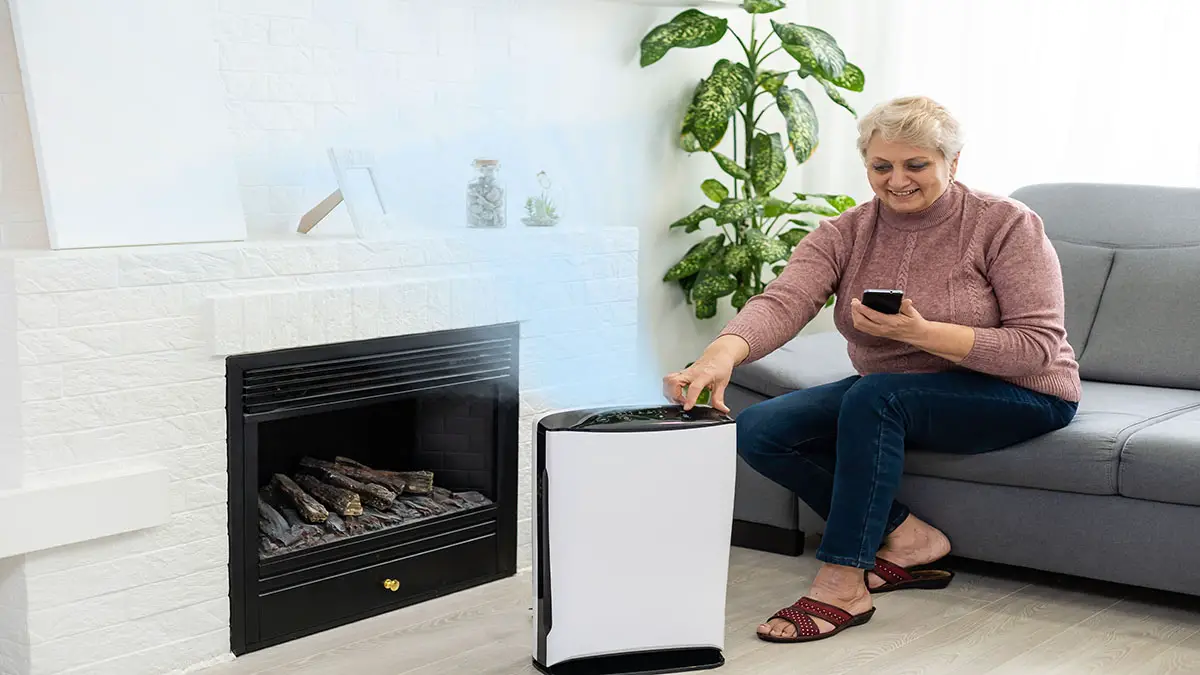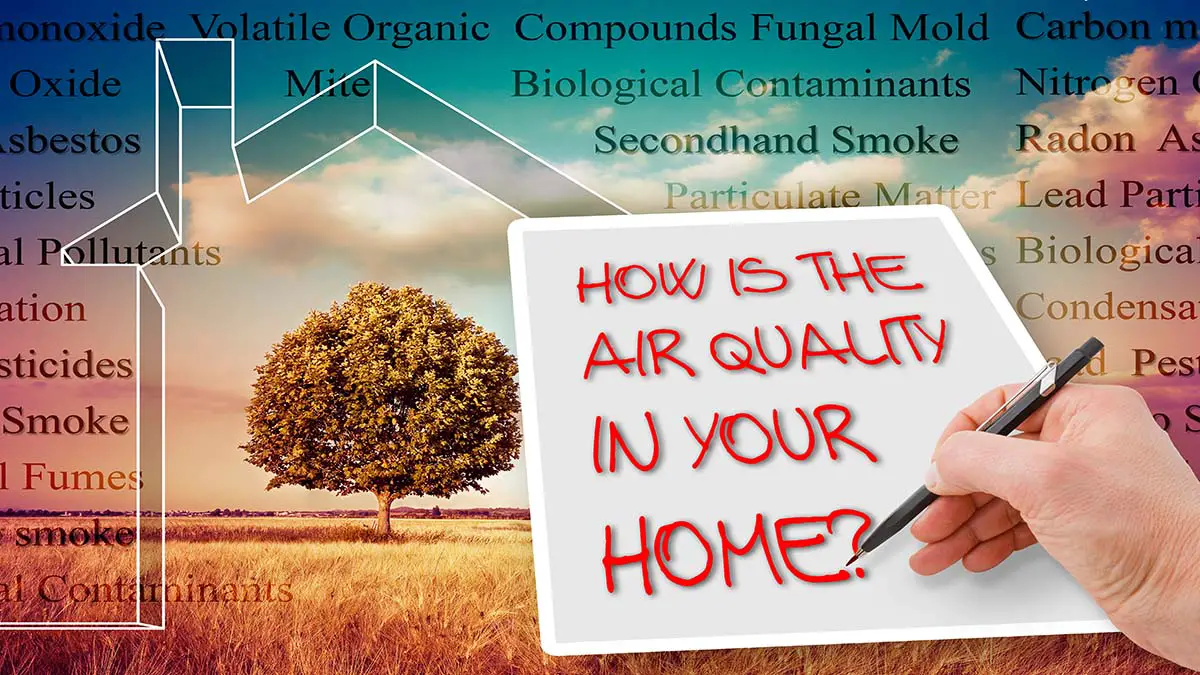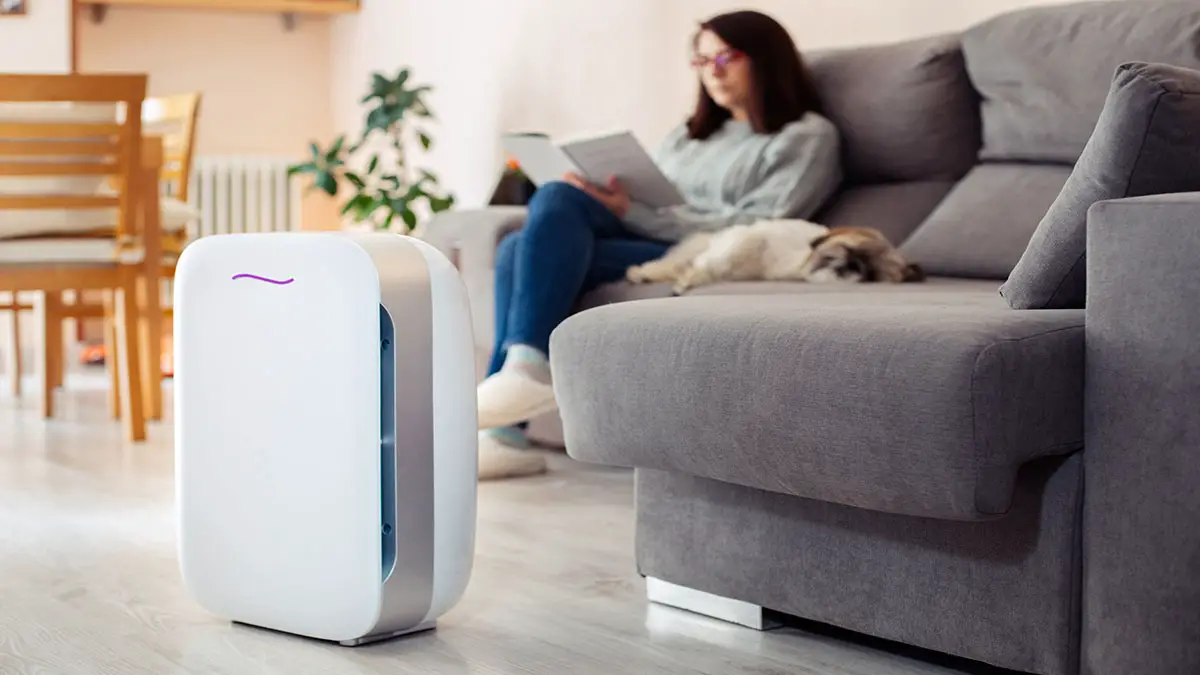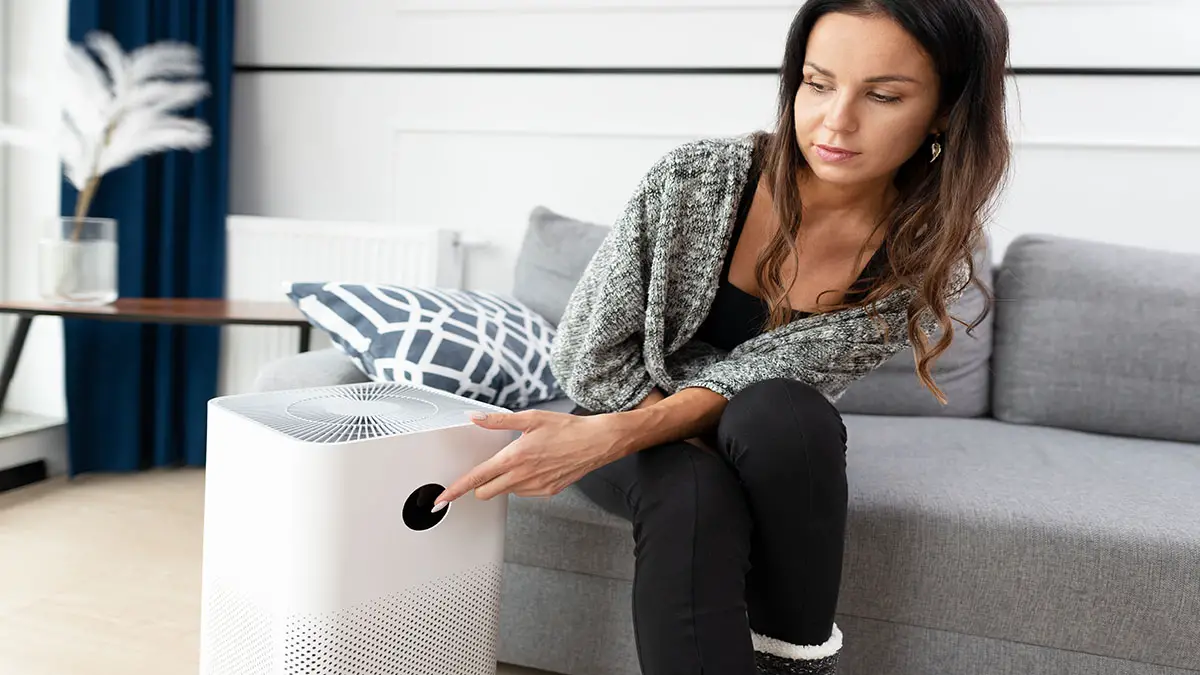People spend up to 90% of their time indoors at home or work. The indoor air we breathe is often more polluted than the outside air. Science is proving that air purifiers have many health benefits, including producing cleaner and healthier air. 1
Air purifier benefits include reducing the risk of respiratory problems, allergies, and asthma. They can also help eliminate unpleasant odors, such as cigarette smoke or cooking smells, and improve indoor air quality.
Air purifiers filter the air, remove harmful particles and pollutants, and provide cleaner air. Many different types of air purifiers are available, each with its features and benefits. 2

Air purifiers can be particularly beneficial for individuals who live in areas with high levels of outdoor pollution or who have compromised immune systems.
Investing in an air purifier can be a simple and effective way to improve your health and quality of life. With a range of models available on the market, it’s essential to research and choose a model that best fits your needs and budget.
Air purifiers draw in air from the surrounding environment and pass it through a series of filters. These filters trap particles and pollutants like dust, pollen, pet dander, and smoke. The most common type of filter used in air purifiers is the HEPA filter, which is capable of trapping particles as small as 0.3 microns in size. 3
Read More: Best Air Purifiers & Reviews
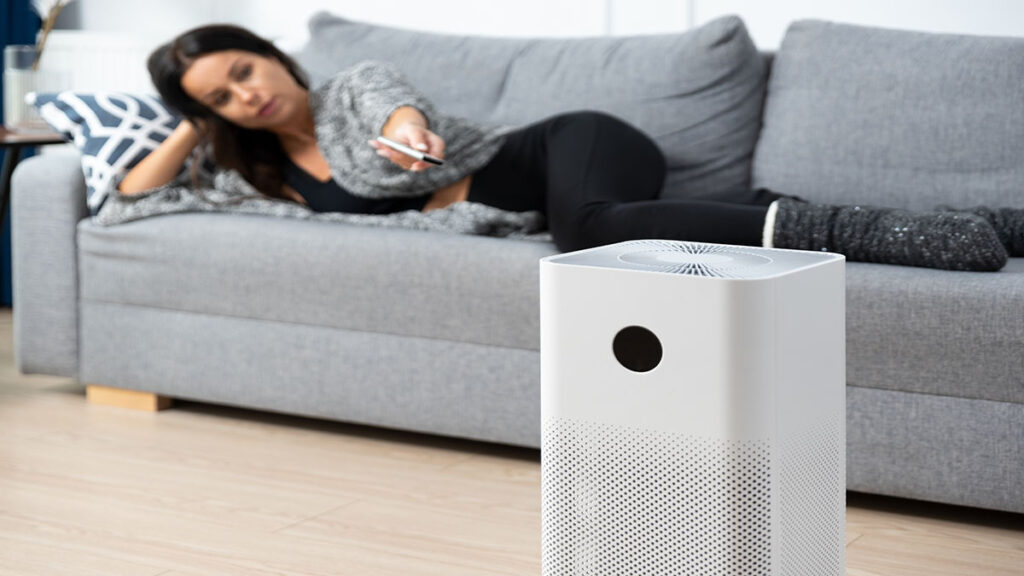
Benefits of Air Purifiers
Air purifier benefits include improved air quality, reduced allergy symptoms, and better respiratory health. By removing harmful particles and pollutants from the air, air purifiers can help reduce the risk of respiratory illnesses and other health problems.
Air purifiers can eliminate pet dander, pollen, and mold spores, relieving individuals with allergies or sensitivities. Furthermore, air purifiers can help remove volatile organic compounds (VOCs) emitted from household products, improving indoor air quality.
Air purifiers can improve sleep quality and well-being by creating a cleaner and healthier environment. Choosing the correct type of air purifier based on specific needs and room size is important to maximize its effectiveness.
An air purifier can significantly impact your health by removing harmful pollutants and allergens from your air. This can be especially beneficial for individuals with respiratory problems such as asthma, allergies, and other respiratory symptoms.
1. Promotes Allergy Relief By Reducing Indoor Allergens
Air purifiers equipped with HEPA filters are highly effective at capturing airborne allergens like pollen, pet dander, dust mites, and mold spores. These allergens are common triggers for allergic reactions, including symptoms like sneezing, coughing, and itchy eyes.
By filtering out these irritants, air purifiers can significantly reduce exposure and alleviate allergy symptoms, making your indoor environment more comfortable and healthier.
Studies assessing the impact of air filters and air conditioners on indoor air quality (IAQ) showed a 50% to 80% reduction in airborne particulate matter, indicating that air filters can significantly lower airborne allergens levels in homes of asthmatic children. 4
Individuals with asthma or other respiratory conditions are susceptible to airborne pollutants. These pollutants, which include dust, pollen, and smoke, can irritate the airways and lead to difficulty breathing, coughing, and an increased risk of asthma attacks.
Air purifiers, especially those with HEPA and activated carbon filters, can remove these irritants from the air. This helps reduce the frequency and severity of asthma symptoms and contributes to overall respiratory health by providing cleaner air.
2. Reducing Airborne Viruses and Bacteria
Many illnesses, such as the common cold, flu, and other respiratory infections, are spread through airborne pathogens. When infected people cough or sneeze, viruses and bacteria droplets are released into the air.
Air purifiers with HEPA filters can capture many of these microscopic pathogens, reducing the overall concentration of airborne diseases in your environment.
Air purifiers with UV-C light technology can inactivate germs and viruses, lowering the risk of airborne illnesses. The powerful ultraviolet light disrupts the DNA structure of microorganisms, rendering them harmless. This can be particularly beneficial in preventing the spread of diseases and improving overall hygiene in your living space.
According to the National Institute of Environmental Health Sciences, proper ventilation and filtration are important to prevent the transmission of airborne viruses at home and work.
Read More: Best Air Purifier for Mold, Viruses, and Bacteria
3. Removing Harmful Chemicals & VOCs
Indoor air can contaminate harmful chemicals and volatile organic compounds (VOCs) from everyday household products like cleaning agents, paints, and furnishings.
These chemicals, such as formaldehyde, benzene, and ammonia, can have short and long-term health effects, including eye, nose, and throat irritation, headaches, and, in some cases, more severe conditions like cancer.
Air purifiers with activated carbon filters are particularly good at trapping these chemicals and neutralizing unpleasant odors associated with them, thereby reducing your exposure to potentially harmful indoor pollutants.
According to the United States Environmental Protection Agency (EPA), indoor air can be up to five times more polluted than outdoor air. This is due to a variety of factors, including the presence of harmful chemicals, gases, and contaminants.
The most common indoor pollutants include nitrogen dioxide, carbon monoxide, and volatile organic compounds (VOCs).
Air purifiers can help to improve indoor air quality by removing these harmful pollutants from the air. They use filters to trap fine particulate matter and contaminants, such as fine particles and VOCs. Some air purifiers also use ozone gas to destroy harmful chemicals and bacteria. 5
4. Better Cognitive Function
Studies have shown that indoor air quality can significantly impact cognitive functions, including concentration, memory, and productivity. Poor air quality can decrease mental performance, making concentrating and processing information harder.
Even at low levels, exposure to outdoor air pollution was linked to a notable decline in cognitive performance. This underscores the need for additional measures to decrease air pollution exposure. 6
By removing pollutants and ensuring a clean air supply, air purifiers can help create an environment conducive to mental clarity and improved cognitive function. This is particularly beneficial in spaces requiring focus and mental acuity, such as offices or study rooms.
5. Lower Risk of Diabetes
Emerging research suggests a link between air pollution and an increased risk of diabetes. Fine particulate matter, a common air pollutant, has been associated with insulin resistance and inflammation, leading to a higher risk of developing type 2 diabetes.
The American Diabetes Association reports findings indicate that PM2.5 might play a role in the higher prevalence of diabetes among adults in the United States. These results further support the existing body of evidence suggesting that air pollution is a contributing factor to the development of diabetes. 7
By filtering out these fine particles and other pollutants, air purifiers can contribute to a healthier living environment and potentially lower the risk of diabetes and other pollution-related health conditions.
6. Reducing Blood Pressure
Fine particulate matter increases the likelihood of developing high blood pressure. Air pollution significantly contributes to the occurrence of cardiovascular diseases and deaths. PM2.5 air pollution, specifically, might be a factor that can be altered to modify the risk of hypertension.
Studies have shown a direct link between decreased air pollution and lower blood pressure levels. This reduction is crucial since high blood pressure is a leading risk factor for heart disease and stroke. 8
Air purifiers contribute to cardiovascular health by reducing exposure to fine particulate matter.
7. Eliminating Odors
Air purifiers equipped with activated carbon filters excel at removing odors. These odors can come from cooking, pets, smoke, or chemicals.
The filter carbon adsorbs odor-causing particles and volatile organic compounds (VOCs), neutralizing smells and leaving the air fresher. This makes your living space more pleasant and can prevent headaches and nausea associated with certain strong odors.
8. Less Dust Buildup
By continuously circulating the air and trapping particulate matter in their HEPA filters, air purifiers effectively reduce dust settling on surfaces. This means less frequent dusting and cleaning and a healthier environment, especially for those with dust allergies.
Pre-filters capture bigger particles, such as pet hair and potential hazards, while the HEPA filter is designed to capture particles as small as 0.3 microns.
9. Better Sleep Environment
Poor air quality can significantly disrupt sleep by causing respiratory irritation or allergic reactions. Air purifiers can create a more comfortable sleep environment by removing allergens and pollutants from the air.
Nighttime allergy symptoms such as nasal congestion, irritation in the nose and throat, and coughing can hinder sleep and raise the likelihood of snoring and other breathing problems during sleep, like sleep apnea.
In addition, being exposed to particles like dust mites, pests, pet dander, mold, and fungi can also heighten the probability of experiencing an asthma attack during the night.
A cleaner breathing space helps prevent symptoms like coughing, sneezing, or a blocked nose, which can interrupt sleep. Additionally, the white noise produced by some air purifiers can aid in better sleep by providing a consistent, soothing background sound.
10. Controlling Mold Growth
Mold spores exist everywhere, being present both indoors and outdoors. It is impossible to eradicate mold spores from indoor spaces completely. While some mold spores may be suspended in the air or settle as dust, they only have the potential to grow when there is moisture.9
Mold spores can lead to allergies, asthma, and other respiratory conditions. HEPA filters in air purifiers can capture these spores, preventing them from settling and proliferating. This control is particularly beneficial in damp areas where mold thrives, helping maintain a healthier living environment and preventing long-term health issues related to mold exposure.
Indoor particulates, including mold spores and certain bacteria, can be filtered by allergen-level HEPA filters like in most high-quality air purifiers.
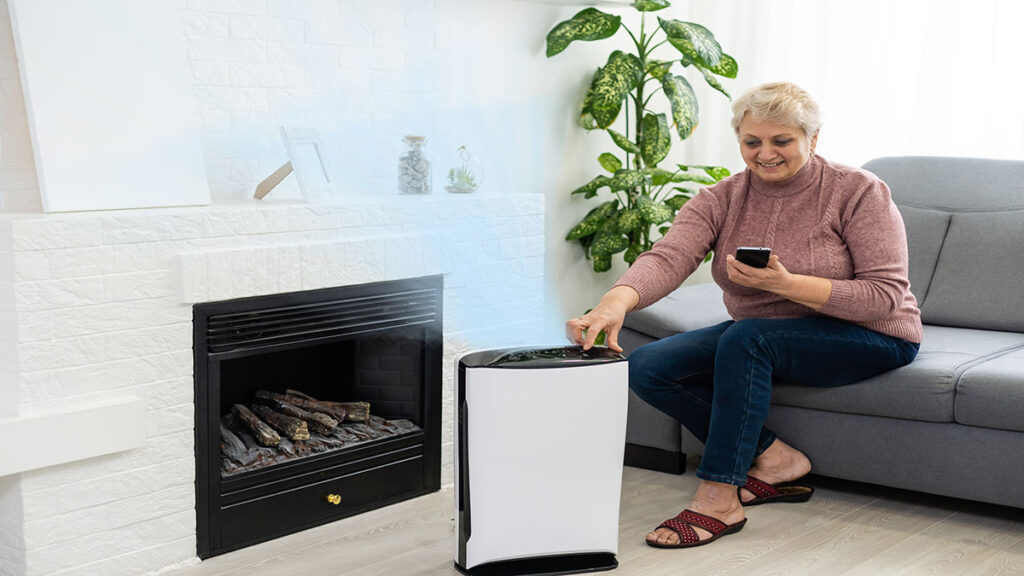
FAQs
Do air purifiers work?
Yes, air purifiers work by trapping various airborne particles, such as dust, pollen, and bacteria, which can improve air quality. Their effectiveness depends on factors like the type of cleaner, the size of the room, and the specific pollutants present.
Is it good to use an air purifier daily?
Using an air purifier daily can be beneficial, especially for people with allergies, asthma, or respiratory conditions, as it continuously removes pollutants and allergens. However, regular maintenance, like filter changes, is crucial for optimal performance.
Is it healthy to sleep with an air purifier?
Sleeping with an air purifier can be healthy, as it can improve air quality by reducing allergens and pollutants, potentially leading to better sleep quality and respiratory health. It’s beneficial for individuals with allergies or asthma.
What are the disadvantages of air purifiers?
Disadvantages of air purifiers include the cost of purchase and ongoing maintenance, potential noise, and the need for regular filter replacements. Some types might produce ozone, which can be harmful to lung health.
Conclusion
Air purifiers offer numerous benefits for improving indoor air quality and reducing exposure to harmful pollutants. By removing indoor air pollutants, air purifiers can help improve your health and overall well-being.
Air purifiers are available in various sizes and types, including portable and whole-house systems. Portable air purifiers are ideal for small spaces and can quickly move from room to room. Whole-house systems are designed to purify the air throughout your home.
When choosing an air purifier, consider the size of your space, the type of pollutants you want to remove, and the air purifier’s performance. Look for air purifiers with HEPA filters to capture small particles like dust, pollen, and pet dander.
Air purifiers can also help reduce the spread of airborne viruses and bacteria. Some air purifiers are designed specifically for this purpose, using UV-C light or other technologies to kill germs and bacteria.
- Delgado-Saborit JM. Indoor air as a contributor to air pollution exposure. Indoor air pollution; issues in environmental science and technology. Cambridge: The Royal Society of Chemistry. 2019 May 8:158-95.
- MacIntosh DL, Myatt TA, Ludwig JF, Baker BJ, Suh HH, Spengler JD. Whole house particle removal and clean air delivery rates for in-duct and portable ventilation systems. Journal of the Air & Waste Management Association. 2008 Nov 1;58(11):1474-82.
- Environmental Protection Agency: What is a HEPA Filter?
- Morishita M, Adar SD, D’Souza J, et al. Effect of Portable Air Filtration Systems on Personal Exposure to Fine Particulate Matter and Blood Pressure Among Residents in a Low-Income Senior Facility: A Randomized Clinical Trial. JAMA Intern Med. 2018;178(10):1350–1357. doi:10.1001/jamainternmed.2018.3308
- Vijayan VK, Paramesh H, Salvi SS, Dalal AA. Enhancing indoor air quality -The air filter advantage. Lung India. 2015 Sep-Oct;32(5):473-9. doi: 10.4103/0970-2113.164174. Erratum in: Lung India. 2016 Nov-Dec;33(6):705. PMID: 26628762; PMCID: PMC4587002.
- Exposure to severe urban air pollution influences cognitive outcomes, brain volume and systemic inflammation in clinically healthy children Brain Cogn. (2011)
- John F. Pearson, Chethan Bachireddy, Sangameswaran Shyamprasad, Allison B. Goldfine, John S. Brownstein; Association Between Fine Particulate Matter and Diabetes Prevalence in the U.S.. Diabetes Care 1 October 2010; 33 (10): 2196–2201. https://doi.org/10.2337/dc10-0698
- Walzer D, Gordon T, Thorpe L, Thurston G, Xia Y, Zhong H, Roberts TR, Hochman JS, Newman JD. Effects of Home Particulate Air Filtration on Blood Pressure: A Systematic Review. Hypertension. 2020 Jul;76(1):44-50. doi: 10.1161/HYPERTENSIONAHA.119.14456. Epub 2020 Jun 1. PMID: 32475316; PMCID: PMC7289680.
- Environmental Protection Agency, Mold Course Chapter 1: https://www.epa.gov/mold/mold-course-chapter-1



